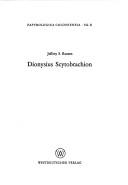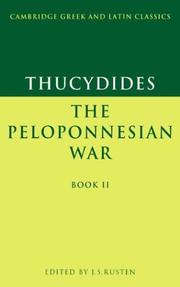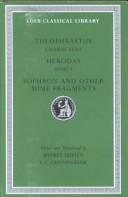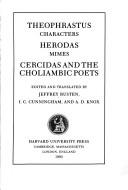| Listing 1 - 10 of 11 | << page >> |
Sort by
|
Book
ISBN: 9780801894480 0801894484 Year: 2011 Publisher: Baltimore, Md Johns Hopkins University Press
Abstract | Keywords | Export | Availability | Bookmark
 Loading...
Loading...Choose an application
- Reference Manager
- EndNote
- RefWorks (Direct export to RefWorks)
Classical Greek literature --- Drama --- Greek drama (Comedy) --- Comédie grecque --- History and criticism. --- Histoire et critique --- Comédie grecque

ISBN: 3531099132 9783531099132 Year: 1982 Volume: 10 Publisher: Opladen Westdeutscher Verl.
Abstract | Keywords | Export | Availability | Bookmark
 Loading...
Loading...Choose an application
- Reference Manager
- EndNote
- RefWorks (Direct export to RefWorks)
Manuscripts, Greek (Papyri) --- Amazons --- Argonauts (Greek mythology) --- Dionysius, Scytobrachion --- -Dionysius, Scytobrachion --- -Criticism and interpretation --- Manuscripts --- Women soldiers --- Argonauts --- Golden Fleece (Greek mythology) --- Jason (Greek mythology) --- Mythology, Greek --- Greek papyri --- Papyri, Greek --- Manuscripts, Classical (Papyri) --- Manuscripts (Papyri) --- Dionysius Scytobrachion --- -Dionysius Scytobrachion --- Dionysius, --- Dionysios, --- Criticism and interpretation. --- Manuscripts. --- Dionysius, Scytobrachion - - Criticism and interpretation --- Dionysius, Scytobrachion - - Manuscripts --- -Amazons

ISBN: 0521326656 0521339294 9780521326650 9780521339292 Year: 1989 Publisher: Cambridge : Cambridge university press,
Abstract | Keywords | Export | Availability | Bookmark
 Loading...
Loading...Choose an application
- Reference Manager
- EndNote
- RefWorks (Direct export to RefWorks)
Thucydides. --- Greece --- Grèce --- History --- Historiography --- Histoire --- Historiographie --- Fukidid --- Tucídides --- Thukydides --- Thoukydidēs --- Tucidide --- תוקידידיס --- Θουκυδίδης --- -Thucydides --- Thucydide --- Thoukudides --- Historiography. --- Thucydides --- Thucydides - History of the Peloponnesian War --- Greece - History - Peloponnesian War, 431-404 B.C. - Historiography
Book
Year: 1982 Publisher: Paderborn ; München ; Wien ; Zürich Schöning
Abstract | Keywords | Export | Availability | Bookmark
 Loading...
Loading...Choose an application
- Reference Manager
- EndNote
- RefWorks (Direct export to RefWorks)

ISBN: 0674996038 9780674996038 Year: 2002 Volume: 225 Publisher: Cambridge (Mass.): Harvard university press
Abstract | Keywords | Export | Availability | Bookmark
 Loading...
Loading...Choose an application
- Reference Manager
- EndNote
- RefWorks (Direct export to RefWorks)
Fictionalized faults are the focus of Characters by Theophrastus (c. 370-c. 285 BCE). The Hellenistic poet Herodas wrote Mimes, in which everyday life is portrayed and character as opposed to plot depicted. Mimes by Sophron (fifth century BCE) and anonymous mime fragments also represent that genre.
Character sketches --- Greek literature --- Cynics (Greek philosophy) --- Pantomimes --- Portraits (Littérature) --- Littérature grecque --- Cyniques (Philosophie grecque) --- Translations into English --- Poetry --- Traductions anglaises --- Poésie --- Character sketches. --- Pantomimes. --- Tableaux --- Balkan literature --- Byzantine literature --- Classical literature --- Classical philology --- Greek philology --- Cynic (Greek philosophy) --- Cynicism (Greek philosophy) --- Cynicism --- Philosophy, Ancient --- Languages & Literatures --- Greek & Latin Languages & Literatures --- Cynics (Greek philosophy). --- Greek literature. --- Portraits (Littérature) --- Littérature grecque --- Poésie --- Characters and characteristics --- Greek drama (Comedy) --- Greece --- Greek drama --- Characteristics, Personal --- Personal characteristics --- Persons --- Typology (Psychology) --- al-Yūnān --- Ancient Greece --- Ellada --- Ellas --- Ellēnikē Dēmokratia --- Elliniki Dimokratia --- Grčija --- Grèce --- Grecia --- Gret͡sii͡ --- Griechenland --- Hellada --- Hellas --- Hellenic Republic --- Hellēnikē Dēmokratia --- Kingdom of Greece --- République hellénique --- Royaume de Grèce --- Vasileion tēs Hellados --- Xila --- Yaṿan --- Yūnān --- Greek literature - Translations into English. --- Cynics (Greek philosophy) - Poetry. --- Greek literature - Translations into English --- Cynics (Greek philosophy) - Poetry
Book
ISBN: 9780199206209 Year: 2009 Publisher: Oxford [etc.] Oxford University Press
Abstract | Keywords | Export | Availability | Bookmark
 Loading...
Loading...Choose an application
- Reference Manager
- EndNote
- RefWorks (Direct export to RefWorks)
Book
ISBN: 9780674996748 0674996747 Year: 2014 Volume: 521 Publisher: Cambridge Harvard University Press
Abstract | Keywords | Export | Availability | Bookmark
 Loading...
Loading...Choose an application
- Reference Manager
- EndNote
- RefWorks (Direct export to RefWorks)
In the writings of Philostratus (ca. 170-ca. 250 CE), the renaissance of Greek literature in the second century CE reached its height. His Life of Apollonius of Tyana, Lives of the Sophists, and Imagines reconceive in different ways Greek religion, philosophy, and art in and for the world of the Roman Empire. In this volume, Heroicus and Gymnasticus, two works of equal creativity and sophistication, together with two brief Discourses (Dialexeis), complete the Loeb edition of his writings. Heroicus is a conversation in a vineyard amid ruins of the Protesilaus shrine (opposite Troy on the Hellespont), between a wise and devout vinedresser and an initially skeptical Phoenician sailor, about the beauty, continuing powers, and worship of the Homeric heroes. With information from his local hero, the vinedresser reveals unknown stories of the Trojan campaign especially featuring Protesilaus and Palamedes, and describes complex, miraculous, and violent rituals in the cults of Achilles. Gymnasticus is the sole surviving ancient treatise on sports. It reshapes conventional ideas about the athletic body and expertise of the athletic trainer and also explores the history of the Olympic Games and other major Greek athletic festivals, portraying them as distinctive venues for the display of knowledge.0.
Dialogues, Greek --- Gymnastics --- Gymnastics. --- Hero worship --- Heroes --- Physical education and training --- Protesilaus (Greek mythology) --- Trojan War --- Philostratus, --- Protesilaus --- Greece --- Athletic training --- Education, Physical --- P.E. (Physical education) --- PE (Physical education) --- Phy ed --- Phys ed --- Physical culture --- Physical training --- Sports --- Training, Physical --- Heroism --- Greek dialogues --- Sports training --- Athletics --- Hero cult --- Training --- Filostrat, Flaviĭ, --- Filóstrato, --- Filostrato, Flavio, --- Filostrato, --- Filostratos, Flawiusz, --- Flavio Filostrato, --- Flavius Philostratus, --- Flawiusz Filostratos, --- Philostratos, --- Philostratos, Phlauios, --- Philostratus, Flavius --- Philostratus, Flavius, --- Philostratus --- Phlauios Philostratos, --- Protesilajas --- Protesilao --- Prōtesilaōs --- Protésilas --- Protesilau --- Prōtesileōs --- Протесилай --- Πρωτεσίλεως --- Πρωτεσίλαως --- Πρωτεσίλαος --- 프로테실라오스 --- プローテシラーオス --- Протесилај --- Протесілай --- Ancient Greece --- Ellada --- Ellas --- Ellēnikē Dēmokratia --- Elliniki Dimokratia --- Grčija --- Grèce --- Grecia --- Griechenland --- Hellas --- Hellenic Republic --- Hellēnikē Dēmokratia --- Kingdom of Greece --- République hellénique --- Royaume de Grèce --- Vasileion tēs Hellados --- Yaṿan --- Education --- Exercise --- Persons --- Antiheroes --- Apotheosis --- Courage --- Superheroes --- Mythology, Greek --- Greek literature --- Worship --- Hellada --- Olympic games (Ancient) --- Sophists (Greek philosophy) --- Medicine --- Jeux olympiques de l'Antiquité --- Sophistes grecs --- Médecine --- Early works to 1800 --- Philosophy --- Ouvrages avant 1800 --- Philosophie --- Early works to 1800. --- al-Yūnān --- Gret͡sii͡ --- Xila --- Yūnān --- Trojan War.

ISBN: 067499244X 9780674992443 Year: 1993 Volume: 225 Publisher: Cambridge (MA) ; London : Harvard University Press,
Abstract | Keywords | Export | Availability | Bookmark
 Loading...
Loading...Choose an application
- Reference Manager
- EndNote
- RefWorks (Direct export to RefWorks)
Character sketches --- Cynics (Greek philosophy) --- Greek literature --- Pantomimes --- Portraits (Littérature) --- Cyniques (Philosophie grecque) --- Littérature grecque --- Poetry --- Translations into English --- Poésie --- Traductions anglaises --- Character sketches. --- Pantomimes. --- 880 --- Balkan literature --- Byzantine literature --- Classical literature --- Classical philology --- Greek philology --- Cynic (Greek philosophy) --- Cynicism (Greek philosophy) --- Cynicism --- Philosophy, Ancient --- Tableaux --- Literature Greek and Classical literatures --- Portraits (Littérature) --- Littérature grecque --- Poésie --- Greek literature - Translations into English. --- Cynics (Greek philosophy) - Poetry.
Book
ISBN: 9780979971341 0979971349 Year: 2011 Publisher: Ann Arbor : Michigan classical press,
Abstract | Keywords | Export | Availability | Bookmark
 Loading...
Loading...Choose an application
- Reference Manager
- EndNote
- RefWorks (Direct export to RefWorks)
Thucydides. --- Greece --- History --- Historiography.
Book
ISBN: 9781501719745 1501719742 1501714821 9781501714825 9780801450631 0801450632 Year: 2017 Publisher: Ithaca, NY
Abstract | Keywords | Export | Availability | Bookmark
 Loading...
Loading...Choose an application
- Reference Manager
- EndNote
- RefWorks (Direct export to RefWorks)
The publication of Jacqueline de Romilly's Histoire et raison chez Thucydide in 1956 virtually transformed scholarship on Thucydides. Rather than mining The Peloponnesian War to speculate on its layers of composition or second-guess its accuracy, it treated it as a work of art deserving rhetorical and aesthetic analysis. Ahead of its time in its sophisticated focus upon the verbal texture of narrative, it proved that a literary approach offered the most productive and nuanced way to study Thucydides. Still in print in the original French, the book has influenced numerous Classicists and historians, and is now available in English for the first time in a careful translation by Elizabeth Trapnell Rawlings. The Cornell edition includes an introduction by Hunter R. Rawlings III and Jeffrey Rusten tracing the context of this book's original publication and its continuing influence on the study of Thucydides.Romilly shows that Thucydides constructs his account of the Peloponnesian War as a profoundly intellectual experience for readers who want to discern the patterns underlying historical events. Employing a commanding logic that exercises total control over the data of history, Thucydides uses rigorous principles of selection, suggestive juxtapositions, and artfully opposed speeches to reveal systematic relationships between plans and outcomes, impose meaning on the smallest events, and insist on the constant battle between intellect and chance. Thucydides' mind found in unity and coherence its ideal of historical truth.
Ancient History & Classical Studies. --- Literary Studies. --- HISTORY / Ancient / Greece. --- Thucydides. --- Greece --- History --- Historiography.
| Listing 1 - 10 of 11 | << page >> |
Sort by
|

 Search
Search Feedback
Feedback About UniCat
About UniCat  Help
Help News
News